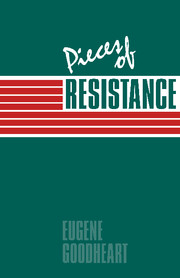Book contents
- Frontmatter
- Contents
- Preface
- Acknowledgments
- Autobiographical
- Part I Critics and criticism
- Part II Contemporary culture in conflict
- Part III Writing in America and elsewhere
- 13 The New Country: Stories from the Yiddish About Life in America
- 14 Three Novels, by Daniel Fuchs
- 15 The demonic charm of Bashevis Singer
- 16 The thirties revisited: Meyer Liben's Justice Hunger and Nine Stories
- 17 Bernard Malamud's A New Life
- 18 Ralph Ellison's Shadow and Act
- 19 William Styron's The Confessions of Nat Turner
- 20 Donald Barthelme's The Dead Father
- 21 Raymond Carver's Cathedral
- 22 Saul Bellow's Him with His Foot in His Mouth and Other Stories
- 23 The claustral world of Nadine Gordimer
16 - The thirties revisited: Meyer Liben's Justice Hunger and Nine Stories
Published online by Cambridge University Press: 05 August 2012
- Frontmatter
- Contents
- Preface
- Acknowledgments
- Autobiographical
- Part I Critics and criticism
- Part II Contemporary culture in conflict
- Part III Writing in America and elsewhere
- 13 The New Country: Stories from the Yiddish About Life in America
- 14 Three Novels, by Daniel Fuchs
- 15 The demonic charm of Bashevis Singer
- 16 The thirties revisited: Meyer Liben's Justice Hunger and Nine Stories
- 17 Bernard Malamud's A New Life
- 18 Ralph Ellison's Shadow and Act
- 19 William Styron's The Confessions of Nat Turner
- 20 Donald Barthelme's The Dead Father
- 21 Raymond Carver's Cathedral
- 22 Saul Bellow's Him with His Foot in His Mouth and Other Stories
- 23 The claustral world of Nadine Gordimer
Summary
It happens in the best of fictions, the way it is written: “After three months,” or “In the year that elapsed.” I find such phrases very unpleasant; usually they mean to me that the author is avoiding the hard reality (he is not alone), the difficulty of everyday life, so he creates these vacuums of time, and then moves to some exciting moment, to something more interesting. It is what makes difficult the description of a working day or of a day-to-day married life. We see the peaks of existence, but all dramas, revelations, epiphanies – call them what you will – require a matrix of experience, of behavior, the necessitous and not always inspiring acts and dreams of the working day, the working marriage. No essence without materia, if I quote the philosophers correctly. …
–from “Justice Hunger”Since Henry James one of the clichés of literary criticism is that the story-teller (whatever the size of the fiction) should show, not tell. Dramatize, dramatize, the Master insisted, and it has become a piety if not a fact of the fictional performance that the writer is devoted to the rendering of the action and feel of experience. When he begins to talk about his characters and their experience, he has somehow failed to do his job.
Meyer Liben always talks about his characters and tells about their experience: there is a minimum of showing, but something in his manner or voice inhibits the almost automatic impulse to pass judgment.
- Type
- Chapter
- Information
- Pieces of Resistance , pp. 138 - 142Publisher: Cambridge University PressPrint publication year: 1987



